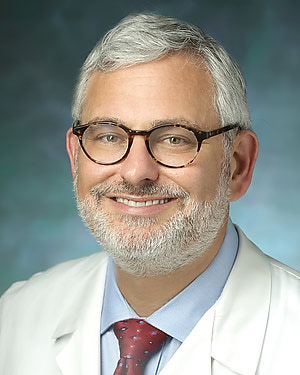Patient Story
Vocal Cord Paralysis: Sandy's Story

Patient Story Highlights
- North Carolina native Sandy Bass had complex thyroid surgery that resulted in her left vocal cord being paralyzed, impairing her voice and her ability to communicate.
- Bass and her husband traveled to Johns Hopkins to see Lee Akst, M.D., who performed a surgical procedure to repair Bass’ vocal cord.
- After the successful procedure, Bass’ voice has returned, and she is active again and connecting with family and friends..
Vocal Cord Paralysis: An Unplanned Outcome
“I was working as hard as I could to get healthy,” says retired English teacher Sandy Bass. The lively 73-year-old was living with a range of health problems, including stubborn arm pain, anemia and difficulty swallowing. Doctors diagnosed a severe hiatal hernia and thyroid nodules in 2003.
Bass says, “The growths were the size of pingpong balls — the area involved was the size of a soda can and extended into my chest.” She says the nodules were forcing her esophagus and windpipe into a contorted C shape, and making it difficult to breathe and swallow.
Bass went through complex surgery close to her home to remove the thyroid nodules. She had more surgery in 2011 to address the hernia. Four years later, an endoscopy revealed that the hernia repair had “slipped,” complicated by a large regrowth of the thyroid nodules, so Bass underwent a robotic procedure to remove them.
After the robotic surgery, she couldn’t talk. The procedure had paralyzed one of Bass’ vocal cords, a complication that can happen after thyroid surgery. A specialist put an implant in the affected vocal cord and told her that with therapy, things would improve. She worked hard with her therapists, but even after six months her voice had only partially returned.
Lee Akst, M.D., director of the Johns Hopkins Voice Center and an expert in laryngology, says that 30 to 40 percent of people with vocal cord paralysis have had neck surgery — thyroid procedures in particular.
A Life Put on Hold
Being unable to talk much above a whisper made things hard for Bass, who loves socializing with friends and family, especially her grandchildren, with whom she shares a close bond.
“My grandchildren were calling me ‘Raspy Rachel,’” she says. “I couldn’t order food at a drive-through because they couldn’t hear me.”
“I was avoiding social situations. I was co-chair of the committee for my 50th class reunion and I couldn’t help out the way I wanted to. After talking on the phone for five minutes, my voice would give out and I could only listen.”
She eventually followed her husband Tom’s advice when he told her she should “go to the best — Johns Hopkins” and try to get her voice back. A friend who had a good experience at Johns Hopkins made some phone calls and got an appointment for Bass with Akst.
As soon as we walked in, there was someone smiling, helping me, showing me where to go. There's just a vibe at [Johns] Hopkins that feels warm and healing.
Sandy Bass
An Understanding Ear — and a Plan

In December 2016, Bass and her husband made the trip — the first of six — to Baltimore from their home in North Carolina.
“As soon as we walked in, there was someone smiling, helping me, showing me where to go,” Bass says. “There’s just a vibe at [Johns] Hopkins that feels warm and healing.”
The good feelings continued when she met her surgeon. “He was just delightful,” Bass says, recalling her first meeting with Akst. “When he walked in the room, he shook my hand and treated me as if I were his only patient. He had obviously reviewed my records, and was prepared to discuss a course of action with me. He looked at me, not the computer.”
“We approach each patient individually and structure the care plan around what’s best for each person,” Akst says. “In (Bass’) case, it appeared her original surgery was done well, and at first I didn’t want to suggest a procedure that might leave her underwhelmed with the result.”
Akst started Bass off with a conservative approach and recommended she work with a new speech therapist near her home. She was reluctant to follow up on her sessions at first. It took some urging from Akst, but Bass eventually applied herself. She saw some improvement, but not much.
The next option was more surgery, which worried Bass since she’d been through so much discomfort with the first procedure. To test the possible benefit of more surgery, Akst bulked up her vocal cord a bit more with an injection of gelatin — a simple, but temporary, treatment.
Bass’ voice came back. She and Akst agreed that surgery to revise Bass’ vocal cord implant was her best hope for a more lasting solution.
Repair, Recovery and a Road Trip

Sandy Bass: A happy patient indeed
Akst also assured Bass that she would be sedated and comfortable for the procedure, which she appreciated. They booked a surgery date for April 2018. “The anesthesiologists were great,” she says. “It wasn’t at all traumatic.”
The surgery did the trick. Akst amended the implant so that the vocal cords made better contact, and Bass’ voice improved immediately.
Over the summer, Bass resumed her annual beach weekend with her pals. “I couldn’t have gone last year,” she says, “Who wants to feel like a wallflower among your friends?”
Best yet, she says, was the reaction from her grandchildren. “Grammy, you sound like yourself again!” they told her.
Bass appreciates not only Akst’s skills but also his understanding demeanor throughout her course of treatment. “Dr. Akst is such a nice guy,” she says. “I’ll be forever grateful to him.”
“My goal is always a happy patient,” Akst says.
Sandy's Surgeon
Johns Hopkins Laryngology

Johns Hopkins laryngologists deliver state-of-the-art care for voice, swallowing and airway disorders to help you feel your best.





